The Climate and Recovery Initiative’s sixth roundtable, held on Thursday 9 September 2021, captured a sense of urgency and momentum towards coordinated and ambitious action on climate change. Prominent leaders from government, business, and civil society alike agreed that things are moving fast toward COP26, and will continue accelerating beyond. Global climate action has reached a tipping point, and Australia will need coordinated policies and action to thrive during this transition.
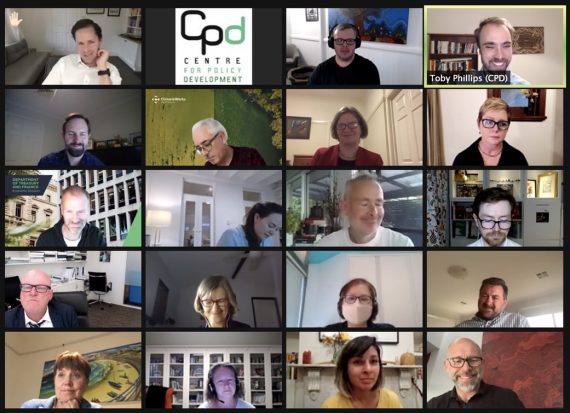
Established in May 2020, the Climate and Recovery Initiative aims to work collaboratively to identify the best ideas for aligning Australia’s economic recovery from the pandemic with a transition towards a net zero emissions economy. The Initiative is coordinated by the Centre for Policy Development (CPD) and ClimateWorks Australia, with a steering group that includes the Australian Industry Group (Ai Group), the Australian Council of Trade Unions (ACTU), and Pollination. Today, eighteen months later, the initiative continues to focus on connecting important discussions on economic reform and global climate transition, as well as making this a reality in Australia.
Over the first five roundtables, the group scoped key priorities and opportunities for action in the leadup to COP26. In this sixth roundtable, in September 2021, participants turned their attention to recent global developments over 2021, as well as important issues where Australia can make progress domestically, including Renewable Energy Industrial Precincts (REIPs) and using procurement as a lever to drive low-carbon business models.
The group considered the impact of international climate action on Australia, with Dr Olivia Gippner from the European Commission vice presidency speaking about recent developments in the EU, including the European Commission’s proposal of a tariff on high-carbon imports: the Carbon Border Adjustment Mechanism (CBAM). Such proposals, as part of wide-sweeping decarbonisation plans, will change the global economics of trade. This is one of several ways that climate policy is becoming intertwined with global finance. The group discussed how Australia’s status as a global outlier is putting pressure on the cost of capital.
The roundtable then turned its attention to REIPs and procurement as key opportunities for decarbonisation, with the group breaking into two parallel discussions. In the procurement session, we heard from members of the business community at the frontier of thinking and adapting procurement policies – using their buying power as a leverage point to drive decarbonisation across the supply chain. There was significant enthusiasm from a range of participants to collaborate further on this issue.
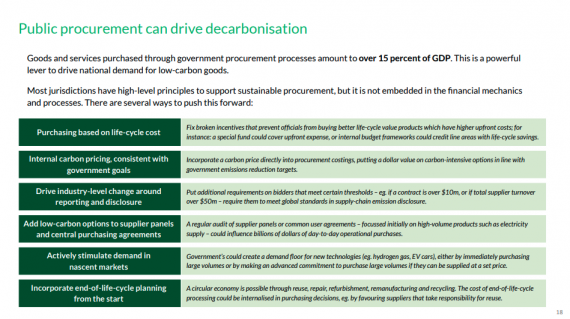
The other parallel discussion focussed on the opportunity of connecting energy-intensive industrial businesses to new renewable energy generation – this was framed by recent analysis from Beyond Zero Emissions and CPD. The discussion identified the barriers to this kind of regional transition – from infrastructure regulation to coalition building – pinpointing exactly where governments could intervene. There was optimism that coordinated action could see some of the locations that Beyond Zero Emissions have identified as ideal precincts thrive.
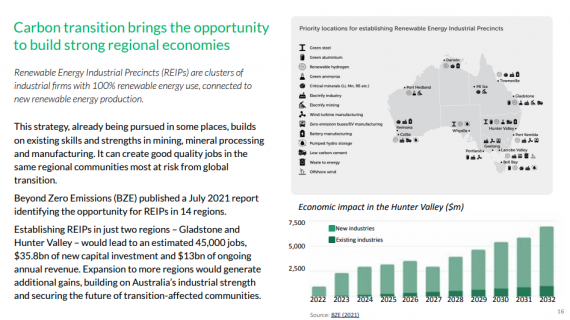
At the conclusion of the discussion, the group looked at COP26 and beyond. COP26 should be viewed as an accelerant of climate action rather than an endpoint. This year’s COP meeting is the 5-year review of the Paris agreement (although it is being held a year late due to Covid-19), and attention will likely turn from long-term commitments to short-term action as the global economy transforms over the next 5 years. The pace of international action is picking up.
Further information on the roundtable, including an agenda, participants and discussion points is available in the meeting pack below.
Key Documents
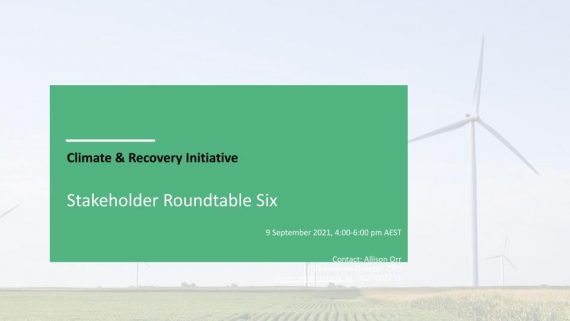 |
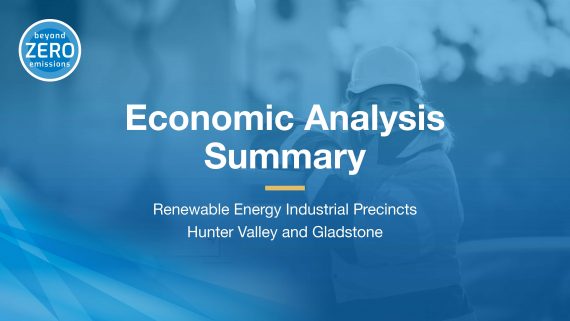 |
|
| Roundtable Six Meeting Pack | Beyond Zero Emissions REIPs Slides |
Related Reading
- Background on the Climate & Recovery Initiative
- Materials from the sixth Climate & Recovery Initiative Roundtable covered in the Australian Financial Review: “Australia’s access to climate may be strangled over climate stance”.
- Op-ed by Program Director Toby Phillips and CEO Travers McLeod, “Time to respond to the climate for investment” in The Australian.
- CPD’s materials on directors’ duties, climate risk and net zero
- Op-ed by Patrick Suckling, Senior Partner at Pollination, “Why not aim for gold in beating climate change, too?” in the Canberra Times.
- Swings and Roundabouts (report from Australian Industry Group on carbon border adjustments)
- Renewable Energy Industrial Precincts: Economic Analysis (report from Beyond Zero Emissions)
- Business, unions unveil green nation-building plan, Australian Financial Review, 28 September 2020
- Global climate action will reshape Australia’s trade, The Australian Financial Review, Toby Phillips, February 2021
- 2021 NSW Intergenerational Report and climate risk background paper



